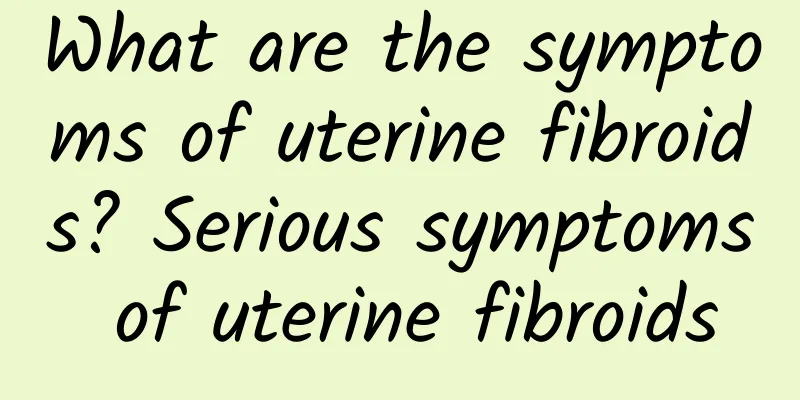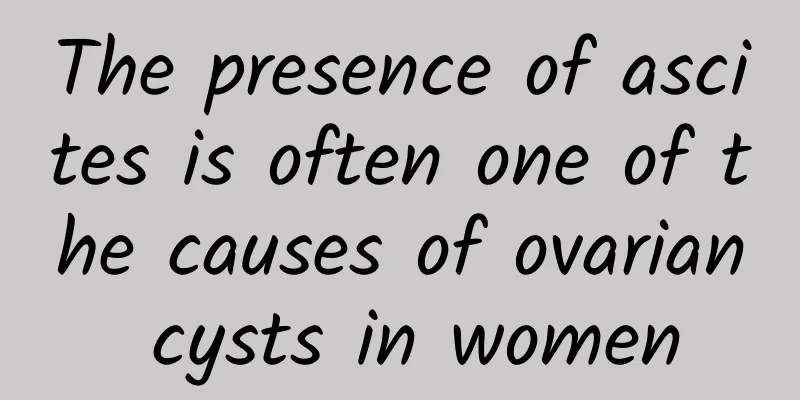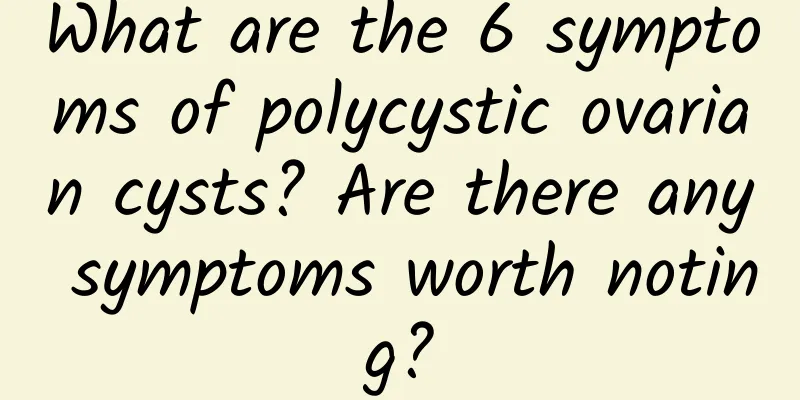What are the symptoms of uterine fibroids? Serious symptoms of uterine fibroids

|
What are the symptoms of uterine fibroids? Serious symptoms of uterine fibroids Uterine fibroids are a common benign tumor in women, usually appearing on the uterine lining of women of childbearing age. The disease has a variety of causes, including genetic factors, hormonal imbalance, lifestyle habits, etc. These factors can cause abnormal proliferation of muscle cell tissue in the uterus, forming lumps of varying sizes. The symptoms of uterine fibroids vary. In mild cases, there may be no obvious symptoms, but in some patients, uterine fibroids can cause a series of serious symptoms, causing great trouble to the patient's life. First, uterine fibroids can cause irregular menstruation. Patients may experience delayed menstruation, increased menstrual flow, prolonged menstruation, etc. Some patients may also experience lower abdominal pain or back pain during menstruation, and the degree of pain may vary depending on the location and size of the fibroids. Secondly, uterine fibroids may cause sexual dysfunction. When the fibroids are large or located in the wrong position, they will compress the uterine cavity, causing discomfort or even pain during sexual intercourse. This may significantly reduce the quality of the patient's sexual life. At the same time, uterine fibroids may also cause pelvic discomfort. Patients may experience a feeling of heaviness in the lower abdomen or waist, or urinary system discomfort symptoms such as frequent urination and urgency. These symptoms are caused by the compression of fibroids on the uterus and surrounding tissues. It is important to note that uterine fibroids are usually benign, but in some cases, they may develop into malignant tumors. Certain serious symptoms may be warning signs of malignant changes. Symptoms such as persistent vaginal bleeding, abnormal increase in vaginal discharge, and significant increase in abdominal mass should be a cause of concern and prompt medical attention for further diagnosis and treatment. Popular Science Introduction: Uterine fibroids are a common benign tumor in women, especially in women of childbearing age. Not all uterine fibroids require immediate treatment, and mild symptoms can be relieved through observation and conservative treatment. However, for patients with severe symptoms and danger signs, such as infertility and frequent urination, treatment is usually recommended, including medication, surgical resection, etc. Therefore, if any symptoms related to uterine fibroids occur, it is recommended to see a doctor as soon as possible, receive diagnosis and treatment from a professional doctor, so as to relieve symptoms in time and restore health. |
>>: What to eat less to prevent uterine fibroids Foods to prevent uterine fibroids
Recommend
Do you know the three major signs of ovarian cysts?
Ovarian cysts have no obvious clinical manifestat...
What are the symptoms of mucous ovarian cysts and how to take care of them
What are the symptoms of mucinous ovarian cysts? ...
How to treat premenstrual migraines?
How to treat premenstrual migraines? Premenstrual...
Is menstrual irregularity a common symptom of uterine fibroids?
Uterine fibroids are a common gynecological disea...
What is it like to have two periods in one month?
Having two periods in one month may be due to abn...
What are the consequences of untreated amenorrhea?
Everyone knows that women will experience the phy...
Is it useful to take sugar substitutes if you want to lose weight? Nutritionists reveal: Things you may be surprised about sugar
Sugar is commonly found in our daily diet, such a...
What are the dangers of congenital absence of vagina?
What is female vaginal amenorrhea? What are the h...
How much do women know about their worries: Things to pay attention to after abortion
After many women have undergone superconducting v...
Treatment of ovarian cysts should be based on type of treatment
Ovarian cysts are mainly divided into 4 types, an...
What are the early symptoms of irregular menstruation?
Irregular menstruation is a common gynecological ...
What is the most appropriate time to have an abortion during pregnancy? What should you pay attention to after an abortion?
Some women need to give up the fetus after an une...
What should patients with pelvic peritonitis eat?
Pelvic peritonitis worries many women. The format...
Lian Huixin's endorsement of Viagra was exposed to contain banned drugs
The weight loss food "Vital Fiber Plus"...
How much does it cost to cure endometriosis?
As our living standards continue to improve, our ...









